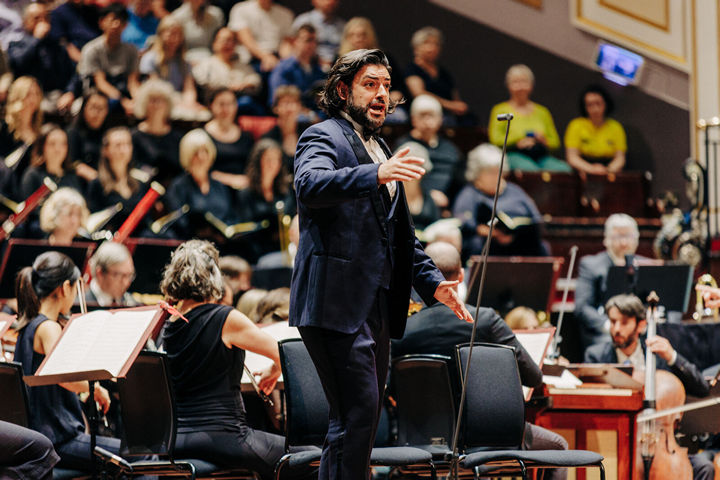| Opera Reviews | 3 May 2024 |
A fun-filled performanceby Catriona Graham |
|
Mozart: Die Zauberflöte |
|
 |
|
|
There are many ways of performing Mozart’s Die Zauberflöte, from stand-and-sing concert to elaborate and deeply symbolic stagings. For the Edinburgh International Festival, the Scottish Chamber Orchestra presents an acted concert version, framed with a new narration written by director David Pountney, which sets the scene, fills in some of the spoken dialogue and describes some of the action. Pountney’s narration highlights the pantomimic elements of the singspiel, heightened by Neil John Gibson, who is perfectly cast as the spoken version of Papageno, with Gyula Orendt his equal in the singing and acting elements of the part. Equally at home in pantomime is Peter Hoare as Monostatos, complete with cricket bat. He does not come over as being evil, just very badly behaved and, when he walks gingerly onstage after receiving seventy-seven foot-whippings, one could find oneself wincing in sympathy. The Three Ladies – Elizabeth Watts, Catriona Morrison and Claudia Huckle – are glamorous, and very determined. It does make it easier to believe they are fighting over Tamino if he actually is half-ways decent-looking, and Ilker Arcayürek passes that test. He also sings the part very well, staking his claims early on in ‘Dies Bildnis ist bezaubernd schön’. While Julia Bullock’s Pamina seems, initially, underwhelming, it becomes apparent that the rather plain singing is part of the ‘character’. As Pamina sees her chances of escape, or not, the timbre of her voice changes dramatically, and the brightness of ‘Tamino mein, o welch ein Glück!’ when she is eventually reunited with him lights up the stage. If the Three Ladies are glam and determined, the Queen of the Night is not standing for any nonsense. Kathryn Lewek is forthright, and ‘Der Hölle Rache kocht in meinem Herzen’ is less a piece of show stopping technical brilliance, more an unambiguous statement of exactly what she is thinking right now. Matthew Brook multitasks as an initially forbidding Speaker of the Temple and as a Priest. Along with Second Priest Ruari Bowen, he plays the support to Brindley Sherratt’s Sarastro, all sweet sense and logic, except when exasperated by Lewek’s Queen of the Night. He has some gorgeous low notes to sing. Meanwhile, what of Papageno? Whereas Tamino is making progress in his trials, the garrulous birdman is in despair, to the extent of taking out a rope and preparing to hang himself. The Three Children arrive in the nick of time, to lead him to his desire – a girlfriend – and the noose is thrown over the head of conductor Maxim Emelyanychev as Papageno runs off after them. At last Papageno meets his girlfriend, and Rachel Redmond’s Papagena is as charming as he could wish. Their duet is the musical equivalent of a couple of teenagers unable to keep their hands off each other. As for the Three Children, Tharuni Kalavannan, Patrick Devlin and Frederick Mushrafi sing sweetly and clearly and convincingly. Emelyanychev is energetic and takes the overture at a fair lick. He rarely lets up the pace and the SCO respond. If there is a calm centre to this performance, it is the SCO Chorus, who provide a rich, rounded sound. If there were any opera first-timers in this audience, this must have been a most accessible introduction to the form. The chortles from the audience at the onstage antics and dialogue are a testament to the success of this presentation. |
|
Photo © Andrew Perry |
|







